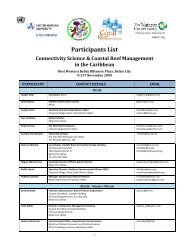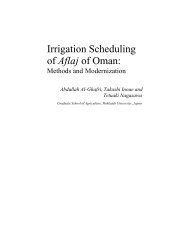The Global Water Crisis: Addressing an Urgent Security - Unu-inweh ...
The Global Water Crisis: Addressing an Urgent Security - Unu-inweh ...
The Global Water Crisis: Addressing an Urgent Security - Unu-inweh ...
Create successful ePaper yourself
Turn your PDF publications into a flip-book with our unique Google optimized e-Paper software.
privatization of the water supply. UN data show that 100% of Uruguay<strong>an</strong>s enjoy access to improved sources of drinking<br />
water, consistent with their constitutional right (World Health Org<strong>an</strong>ization <strong>an</strong>d United Nations Children’s Fund, 2010).<br />
Empirical data offers a compelling rebuttal to critics of the right to water.<br />
In a number of nations where there is no explicit constitutional right to water, courts have held that the right to water is<br />
<strong>an</strong> implicit but enforceable constitutional right (Boyd, 2012). <strong>The</strong>se nations include:<br />
• Argentina (Picolotti, 2005; Beatriz Mendoza, 2008);<br />
• Belgium (Judgement No. 36/98, 1998);<br />
• Brazil (Supreme Court of Justice, 2006);<br />
• Costa Rica (Supreme Court of Costa Rica, Sala Constitucional, 2007);<br />
• Colombia (Defensoria del Pueblo, 2009);<br />
• India (Narain, 2010);<br />
• Indonesia (Judicial Review of the Law No. 7 of 2004 on <strong>Water</strong> Resources);<br />
• Israel (Zarchin, 2011);<br />
• Nepal (Belbase <strong>an</strong>d Thapa, 2007); <strong>an</strong>d,<br />
• Pakist<strong>an</strong> (General Secretary West Pakist<strong>an</strong> Salt Miners Labour Union, 1994).<br />
Courts in these nations based their decisions on the fact that access to safe drinking water is a fundamental prerequisite<br />
to the enjoyment of other hum<strong>an</strong> rights, including the right to life <strong>an</strong>d the right to live in a healthy environment. <strong>The</strong><br />
right to life, which arguably includes <strong>an</strong> implicit right to water, is universally found in national constitutions (Law <strong>an</strong>d<br />
Versteeg, 2011). <strong>The</strong>re are more th<strong>an</strong> 90 nations whose constitutions now explicitly recognize the right to live in a healthy<br />
environment (Boyd, 2012), <strong>an</strong>d the right to cle<strong>an</strong> water is regarded as <strong>an</strong> integral element of this broader right. Empirical<br />
evidence demonstrates that there is a strong positive correlation between environmental provisions in constitutions <strong>an</strong>d<br />
superior environmental perform<strong>an</strong>ce (Boyd, 2012).<br />
For example, in Argentina, based on the constitutional right to a healthy environment, courts have ordered governments<br />
to provide communities with potable water, construct drinking water treatment facilities, provide medical treatment for<br />
individuals harmed by contaminated drinking water, <strong>an</strong>d carry out environmental remediation of polluted watersheds.<br />
An Argentine case involving Chacras de la Merced, a poor community whose drinking water was being contaminated<br />
by inadequate wastewater treatment in <strong>an</strong> upstream municipality, illustrates the potential for using the right to a<br />
healthy environment to adv<strong>an</strong>ce the right to water (Picolotti, 2005). An environmental NGO brought a lawsuit against<br />
the upstream municipality <strong>an</strong>d the province on behalf of local residents, asserting a violation of their constitutional<br />
right to a healthy environment. <strong>The</strong> Court agreed that there was a violation of the right <strong>an</strong>d ordered the government to<br />
upgrade the wastewater treatment pl<strong>an</strong>t <strong>an</strong>d, in the interim, provide a supply of cle<strong>an</strong> water to the residents of Chacras<br />
de la Merced. <strong>The</strong> court-ordered infrastructure improvements were completed, <strong>an</strong>d in <strong>an</strong> interesting development, the<br />
municipality passed a bylaw m<strong>an</strong>dating that all future sewage <strong>an</strong>d s<strong>an</strong>itation tax revenues must be reinvested in upgrading<br />
<strong>an</strong>d maintaining the sewage system. Similarly, on the basis of the right to a healthy environment, the Supreme Court of<br />
Argentina ordered federal, provincial, <strong>an</strong>d municipal governments to cle<strong>an</strong> up <strong>an</strong>d restore the heavily polluted Mat<strong>an</strong>za-<br />
Riachuelo watershed, home to millions of people (Beatriz Mendoza, 2008). <strong>The</strong> World B<strong>an</strong>k has provided US $840 million<br />
for water <strong>an</strong>d s<strong>an</strong>itation infrastructure as a direct result of the Supreme Court’s judgement (World B<strong>an</strong>k, 2009).<br />
<strong>The</strong>re were over 9,000 constitutional cases brought in Colombia between 1991 <strong>an</strong>d 2008 related to the provision of potable<br />
drinking water <strong>an</strong>d basic s<strong>an</strong>itation (Defensoria del Pueblo (Ombudsm<strong>an</strong>), 2009). Pakist<strong>an</strong>’s Supreme Court held that “the<br />
right to have water free from pollution <strong>an</strong>d contamination is a right to life itself” (General Secretary West Pakist<strong>an</strong> Salt<br />
Miners Labour Union, 1994). As observed in a recent Harvard Law Review article: “Although justiciability alone is not a<br />
p<strong>an</strong>acea, it is a step in the direction of ensuring access to sufficient water” (Harvard Law Review, 2007: 1069).<br />
Constitutional recognition of the right to water does not create <strong>an</strong> absolute right to water. Courts will take into account<br />
the specific circumst<strong>an</strong>ces of a case <strong>an</strong>d the challenges facing a government in determining whether the right is being<br />
violated (see Mazibuko et al. v. <strong>The</strong> City of Joh<strong>an</strong>nesburg, 2010).<br />
132 <strong>The</strong> <strong>Global</strong> <strong>Water</strong> <strong>Crisis</strong>: <strong>Addressing</strong> <strong>an</strong> <strong>Urgent</strong> <strong>Security</strong> Issue




